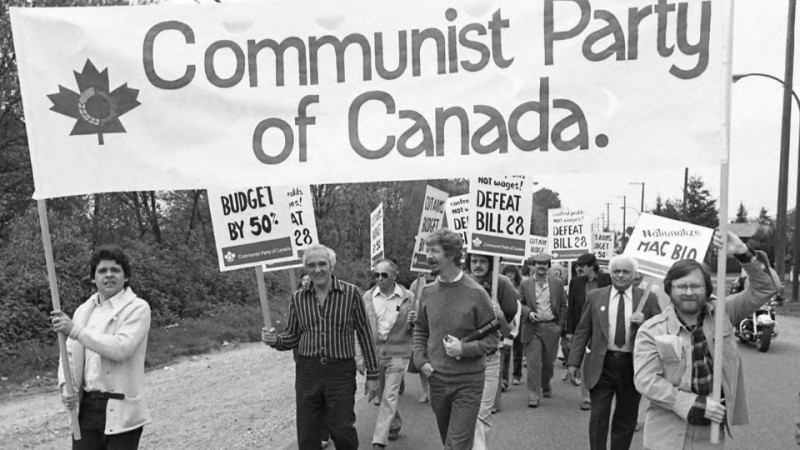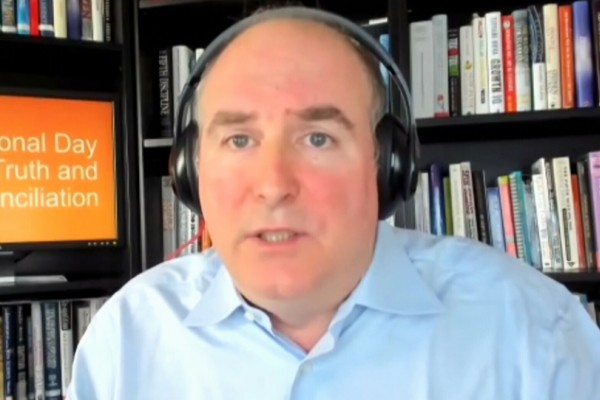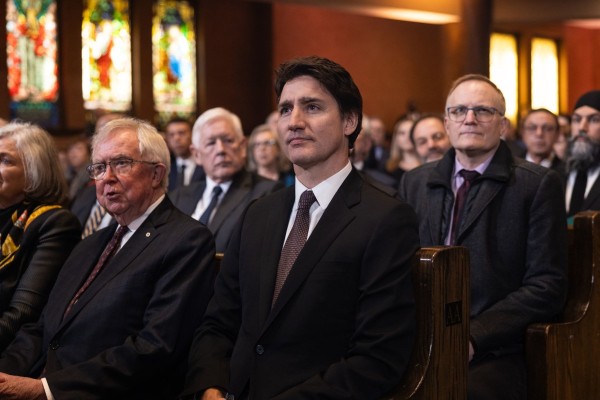Red scare on the federal campaign trail
Winnipeg South Centre candidate Cam Scott corrects the record on Liberal Ben Carr’s anti-communist remarks

Ben Carr is running for the Liberal Party in Winnipeg South Centre. Image courtesy Ben Carr/Facebook.
Running in an election for the Communist Party of Canada is a great way to have a lot of surreal experiences quickly. For the most part, people are happy to talk to us and highly receptive to our ideas, however they choose to vote; and given the present state of things, I expect this receptiveness to grow. It’s the strong resistances that fascinate me, where hardcore anti-communists will simultaneously scoff at our supposed irrelevance and shake their fist at our presumed advance. I’ve heard versions of this contradictory dismissal on more than a few doorsteps, but I was surprised to see such kettle logic in the pages of the Globe and Mail, straight from the mouth of an incumbent MP for the Liberal Party of Canada.
To help make sense of things, I’ll start with a brief chronology of events during this quick election as concerns my riding, Winnipeg South Centre. On April 1, Winnipeg’s Asper Jewish Community Campus hosted an event called “Triggered, The Tour: From Combat to Campus,” featuring two Israel Defense Forces (IDF) soldiers who participated firsthand in the siege on Gaza. Naturally, there were protests outside of this provocatively titled event, which gave voice to veterans of a current war that is regarded by most international observers as a well-evidenced genocide. Of course the protesters did not choose this location, but the next day, Ben Carr, Liberal MP for Winnipeg South Centre, rushed to the event’s defence on social media, calling for “bubble legislation” to protect religiously affiliated facilities from protest. “If one wants to make a political statement or protest public policy, I support, always, the right to do it,” Carr wrote, “but never in front of religiously affiliated spaces.”
Carr himself has previously attempted to interfere with Palestinian speakers at the University of Winnipeg, and recently voted against a ceasefire and arms embargo in the House of Commons—so his own record on this issue is well-known. Beyond the matter of Carr’s personal convictions, many of his constituents correctly identified a compelling threat to freedom of peaceful assembly as protected by the Canadian Charter of Rights and Freedoms, and went about voicing their concerns by various means, including popular petitions and weekly rallies outside of his campaign office. At the same time, the progressive candidates running against the incumbent in the present federal election—from the NDP, the Green Party of Canada, and the Communist Party of Canada—co-signed a letter of invitation to Mr. Carr, asking him to a taped conversation on the right to protest so that we could meaningfully debate what was clearly a pressing concern for his constituents.
Carr didn’t respond, which was hardly surprising. His campaign is a juggernaut, backed by a commonly held belief in the necessity of “strategic voting” that risks binarizing Canada’s already meagre multi-party system. 338 Canada places Carr’s chance of victory at 99 percent—so why would he hurt his chances by subjecting a dashed-off, legally dubious, and controversial policy proposal to public scrutiny? The next time I saw Carr was on April 24, at an all-candidates forum hosted by students at Kelvin High School, his alma mater. After some ceremonial remarks on his own student years and an abbreviated rehash of the Liberal Party’s achievements over his last term, he thanked the other candidates for running and praised the importance of civil disagreement in divisive times.
Imagine my surprise to see the ever-civil Carr quoted in the Globe and Mail only hours later, in an article on NDP leader Jagmeet Singh’s recent visit to Winnipeg. Here Carr addresses the topic of the debate he wouldn’t face, but glibly and indirectly; actually attempting to discredit the NDP by collating them wholesale with the Communist Party of Canada. I quote:
Carr said it was “perplexing” that the NDP “was choosing to align itself with the Communist Party of Canada, given what we know about the way that communist-led dictatorships around the world, throughout history, have treated freedom of expression,” Carr said. “The irony is certainly not lost on me.”
This McCarthyist scoff is beneath any reasonable standard of debate, particularly where the far-right in the United States has mobilized behind a fairly explicit proposal to repress and criminalize socialist politics. Whether Carr is ignorant of Canadian history or whether he means to deceive is immaterial so long as he is taken seriously and given ample space to repeat time-worn canards in a paper of record. But for those with a modicum of decency and a taste for justice, permit me, as the candidate he smears, to offer some additional context.
The Communist Party of Canada has never restricted anybody’s freedom of expression. Rather, we have been outlawed and imprisoned, censored and surveilled, sidelined and lied about, even as we have continued to fight unconditionally for the democratic rights of all Canadians. We helped to build the trade union movement in this country, and have been at the forefront of the peace movement for decades. In each of these capacities we have seen firsthand how little value is afforded freedom of assembly and expression in a capitalist democracy.
Members of the Communist Party of Canada on the march in the late 1970s.
Not only did the Communist Party warn of the looming threat of political repression by the Canadian state last fall, as Carr’s Liberal Party joined the Conservatives in moving to criminalize Palestinian solidarity, we are as consistent in defending the democratic rights of movements of which we want no part. When the Liberals invoked the Emergencies Act in February 2022, the Communist Party strongly opposed this move as an attempt to suspend the civil and democratic rights of all Canadians, even as we stood alongside the anti-fascist opposition to the Freedom Convoy, against whom the act was wielded.
We have fought to expand and deepen democracy in Canada in elections as well, and to protect the democratic rights of small parties such as ourselves. The Figueroa v Canada case, named for our then-leader, argued that the government’s 50-candidate threshold for party registration under the Elections Act violated section three of the Canadian Charter of Rights and Freedoms. The Supreme Court ruled in our favour, and as a result, Canada’s democratic process is far more varied at the ballot box, though still highly exclusionary in many respects. This ruling has paved a way for innumerable small parties of all ideological stripes, and however Carr chooses to speak about us, we are certain that our participation in open forums such as he declines to engage is a benefit to Canadian democracy.
In his plea for civility, Carr repeats the commonplace idea that political discourse in this country is increasingly fractious and divisive. The irony, of course, is that there has never been such a strong consensus on almost every major policy area across the Canadian political spectrum—as regards military expenditure, austerity and privatization, lip service to and subsequent disregard for Indigenous title, and so much more. This is precisely the terrain on which the Communist Party hopes to intervene. Were we elected, we would hope to take part in a progressive bloc with such other left MPs—though one likely outcome of the Liberal sweep will be a thinning out of true progressives in Canada’s Parliament.
I would only ask Mr. Carr just what is to be gained from smearing the name of a century-old party otherwise beneath his professional concern? Are we to be feared, or ignored? Is a spectre of communism haunting Winnipeg South Centre, such that he needs to play cheap games and draw upon tired prejudices? It’s as shameful that the Liberal incumbent can’t face the NDP, former partners in a coalition government, without stooping to such Red Scare tactics—but it goes to show that even as polls anticipate a strong majority government, the Liberal Party finds itself pressed from the left, as it should. This is a positive sign, and as Carr is sure to pursue his proposed anti-protest legislation in Parliament, the campaign to defend the right to assembly from Liberal and Conservative encroachment will undoubtedly continue to grow. Whether Mr. Carr likes it or not, the Communist Party of Canada will remain in this struggle for more popular democracy, as we have unflaggingly for generations. No aspersions can revise that record, and no bubble can keep us from wielding these freedoms we are proud to defend.
Cam Scott is the Communist Party of Canada candidate for Winnipeg South Centre.










_600_400_90_s_c1.jpeg)